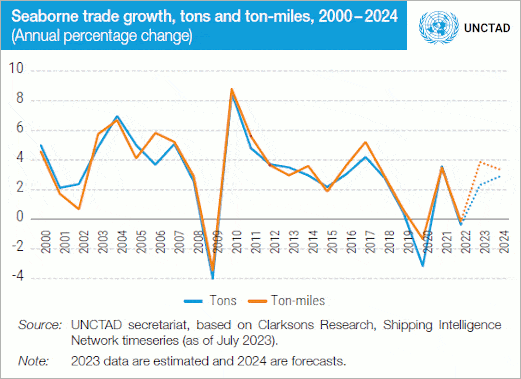
In 2022 the volume of goods transported by sea is
increased slightly by +0.4% compared to the previous year, but the
United Nations Conference on Trade and Development (UNCTAD)
expects growth to be stronger in 2023 and
equal to +2.4%, an increase that the United Nations body considers
will continue slightly more contained in the five-year period
next with a +2.1% in 2024 followed by a +2.2% in 2025 and then
+2.2% in 2026, +2.1% in 2027 and +2.1% in 2028.
In the latest edition of his publication "Review of
maritime transport", UNCTAD specifies that different is
the evolution of the volume of container loads transported only
sea that in 2022 recorded a decrease of -3.7%, decrease that -
according to UNCTAD - will be followed this year by a recovery of the
+1.2% which will strengthen in the five-year period 2024-2028 with
increases of +3.2%, +3.2%, +3.2%, +3.0% and +2.9% respectively.
The UN body noted that the expected growth rate in
However, the next few years is significantly lower than
growth of about +7% recorded in the previous three decades.
In addition, UNCTAD pointed out that the
Continuous maritime transport could enter a phase of
overcapacity that shipping companies could
having to cope with the postponement of the delivery of
New ships ordered from shipyards, slow steaming reducing
the navigation speed of container ships in service, or
the dismantling of ships in their fleets.
However - UNCTAD warned - the main challenge that the
Maritime transport sector will have to face is
the one determined by the transformation path that shipping
will have to undertake for its decarbonization. "Find
A balance between environmental sustainability, compliance
to regulations and economic needs - underlines the "Review
of maritime transport - 2023" - is essential for a
the future of prosperous, fair and resilient shipping."
UNCTAD pointed out that the costs for the transport transition
maritime towards its decarbonization will be significant being
Needed - in the opinion of the UN body - additional 2-28 billion
dollars per year to decarbonise ships by 2050, and
Even more investments will be needed, between 28
and $90 billion a year, to develop
Infrastructure to supply shipping with zero fuels
carbon emissions. The UNCTAD publication specifies that the
Full decarbonisation could lead to an increase from +70%
+100% of annual expenditure on the purchase of marine fuels,
costs that would mainly penalise small island states
developing countries and the least developed countries that are heavily dependent
measure from maritime transport.
'Economic incentives, such as levies and contributions paid in
report to emissions from maritime transport - noted to
in this regard, UNCTAD's Director of Technology and Logistics,
Shamika N. Sirimanne - can promote the initiative and the
competitiveness of alternative fuels and reduce the
cost gap compared to conventional heavy fuels.
These funds could also facilitate investment in ports.
small island developing states and less than
developed, focusing on adapting to changes
climate, trade and transport reforms, and
on digital connectivity'.
In order to ensure a just transition, UNCTAD calls for a
universal regulatory framework applicable to all ships,
regardless of their flag, ownership or
from their operational area.
On the occasion of the publication of its report, UNCTAD
also expressed concern about the ageing of the fleet
World Championship which at the beginning of this year had an average age of
22.2 years, two years more than ten years ago. In addition
more than half of the world's fleet has more than 15
years.
